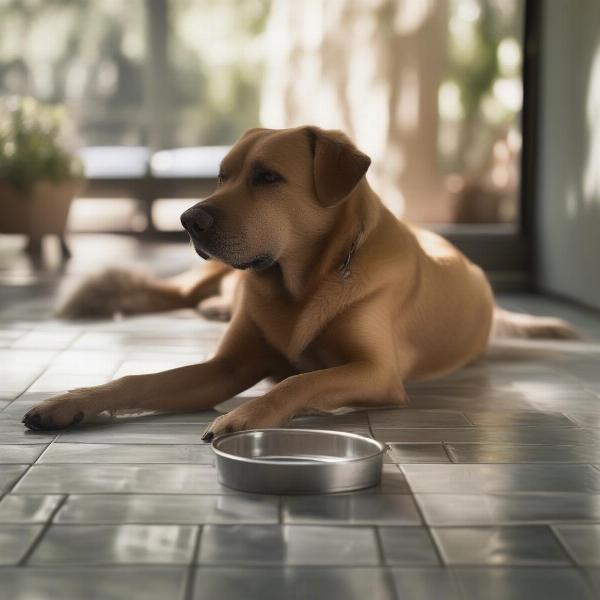Panting in older dogs is a frequent concern for many owners. While some panting is normal, excessive or unusual panting can signal an underlying health problem. Understanding the causes of panting in senior dogs is crucial for ensuring their well-being. This article will explore the various reasons why older dogs pant, when to be concerned, and what steps you can take to help your furry friend.
As dogs age, they become more susceptible to certain health conditions that can manifest as increased panting. This can range from relatively minor issues like pain or anxiety to more serious problems such as heart or lung disease. It’s essential to differentiate between normal panting and panting that warrants a visit to the veterinarian.
Common Causes of Panting in Older Dogs
Several factors can contribute to panting in senior dogs. Some of the most common include:
- Pain: Arthritis, hip dysplasia, and other age-related aches can cause discomfort, leading to increased panting. Observe your dog for other signs of pain, such as limping, stiffness, or reluctance to move.
- Heart Problems: Heart disease is prevalent in older dogs and can cause the heart to work harder, resulting in panting. Other symptoms might include a cough, reduced exercise tolerance, and weakness.
- Respiratory Issues: Conditions like pneumonia, bronchitis, and lung cancer can make breathing difficult, leading to panting. Look for signs like coughing, wheezing, and nasal discharge.
- Obesity: Carrying extra weight puts a strain on an older dog’s heart and lungs, leading to increased panting, especially during exercise.
- Heatstroke: Older dogs are more susceptible to heatstroke, and excessive panting is one of the earliest signs. Other symptoms include rapid heart rate, vomiting, and collapse.
- Anxiety: Changes in routine, new environments, or separation anxiety can trigger panting in older dogs.
When to Worry About Panting in Your Senior Dog
While some panting is normal, especially after exercise or in warm weather, there are times when you should seek veterinary attention:
- Sudden onset of heavy panting: If your dog suddenly starts panting heavily for no apparent reason, it could be a sign of a serious problem.
- Panting accompanied by other symptoms: If panting is accompanied by coughing, vomiting, weakness, or collapse, immediate veterinary care is necessary.
- Panting that persists despite rest and cool temperatures: If your dog continues to pant heavily even after resting in a cool environment, this warrants further investigation.
- Changes in panting pattern: If your dog’s panting sounds different or seems more labored than usual, consult your veterinarian.
Managing Panting in Older Dogs
Depending on the underlying cause, several strategies can help manage panting in senior dogs:
- Maintain a healthy weight: Keeping your dog at a healthy weight reduces stress on their heart and lungs.
- Provide a cool and comfortable environment: Ensure your dog has access to shade and fresh water, especially during hot weather. Consider a pyjama for dogs during colder months.
- Manage pain: If your dog is experiencing pain due to arthritis or other conditions, work with your veterinarian to develop a pain management plan.
- Address anxiety: If anxiety is the cause, try creating a calming environment and consider behavioral modification techniques.
- Regular veterinary checkups: Routine checkups can help detect and manage underlying health conditions early.
Can Medications Cause Panting in Senior Dogs?
Certain medications, such as steroids and some pain relievers, can cause increased panting as a side effect. If your dog started panting after starting a new medication, discuss it with your veterinarian.
 Senior dog resting in a cool environment
Senior dog resting in a cool environment
Conclusion
Panting in older dogs can be a sign of various underlying issues, ranging from minor discomfort to serious health problems. By understanding the potential causes and recognizing when to seek veterinary care, you can help ensure your senior dog’s comfort and well-being. Remember, heavy panting in older dogs should never be ignored. Prompt attention and appropriate management can significantly improve your furry friend’s quality of life.
FAQ
- Is it normal for my older dog to pant more than when they were younger? Some increase in panting can be normal due to age-related changes, but excessive or sudden changes in panting should be investigated.
- What should I do if my older dog is panting heavily? Assess the situation, look for other symptoms, and if concerned, contact your veterinarian immediately.
- Can I give my older dog human medication for pain? Never give your dog human medication without consulting your veterinarian. Human medications can be toxic to dogs.
- How can I help my anxious older dog pant less? Create a calming environment, try behavioral modification techniques, and consult your veterinarian.
- What is the best way to keep my older dog cool in hot weather? Provide access to shade, fresh water, and consider using cooling mats or fans. Never leave your dog in a parked car.
- How often should my older dog see the vet? Senior dogs should generally have checkups every six months to monitor their health.
- Could senior dog panting be a sign of Cushing’s disease? While panting can be a symptom, it’s usually accompanied by other signs like increased thirst, urination, and appetite. Consult your vet for diagnosis.
Related Articles:
About ILM Dog
ILM Dog is your trusted resource for expert dog care advice and guidance. We offer comprehensive information on dog breeds, health, training, nutrition, grooming, and much more. Our mission is to empower dog owners with the knowledge and tools they need to provide the best possible care for their canine companions. Whether you are welcoming a new puppy into your home or caring for a senior dog panting, we’re here to support you every step of the way. For any questions or concerns, feel free to contact us at [email protected] or +44 20-3965-8624.